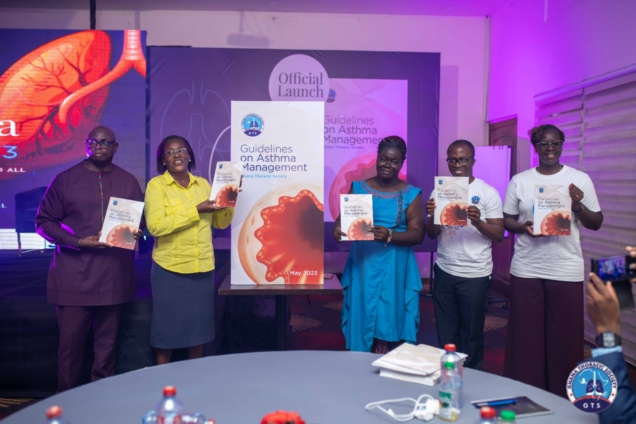The Ghana Thoracic Society (GTS) has unveiled the National Asthma Guidelines, to provide a uniform approach to asthma diagnosis and guide disease treatment and management in Ghana for better patient outcomes.
The Asthma Guidelines was launched on May 2, in Accra to commemorate World Asthma Day and to create awareness and knowledge of asthma, enhance illness treatment, and lessen the disease's impact.
Dr Clement Laryea, President of the Ghana Thoracic Society (GTS), said the development of the document is the outcome of significant study and cooperation among healthcare experts and stakeholders in the nation to offer clear and comprehensive advice for diagnosing, treating, and managing asthma in adults and children alike.
According to Dr Clement Laryea, Asthma is a major public health issue in Ghana, and its prevalence is rising.
"Creating this guideline is an important step towards better asthma treatment and lowering the burden of asthma on people, families, and the healthcare system.

"We believe the manual will provide medical professionals with the tools they need to improve asthma treatment in Ghana and, as a result, the quality of life for people with asthma."
Dr Laryea assured that the guideline covers all aspects of asthma care, from initial diagnosis and assessment to ongoing management and follow-up.
It also includes medication recommendations, including inhaled corticosteroids, bronchodilators, and oral medications.
Asthma is a chronic respiratory condition affecting millions of individuals throughout the globe, including Ghana. Available records from the World Health Organisation (WHO) indicate that over three million Ghanaians suffer from asthma, which, if left untreated, may cause severe morbidity and death.
Asthma care is critical for preventing and controlling symptoms, improving quality of life, and lowering the risk of severe asthma episodes.
The new guideline also emphasises the importance of patient education, self-management strategies, and all aspects of asthma care, from initial diagnosis and assessment to ongoing management and follow-up, such as avoiding triggers and maintaining a healthy lifestyle.
The GTS hopes that the guideline will improve the quality of care for asthma patients in Ghana and reduce the burden of the disease on individuals, families, and society as a whole.
The GTS, through the Ghana Health Service and the Health Ministry will disseminate the guidelines to healthcare professionals nationwide and provide training on its implementation.
The society also plans to work with policymakers to ensure the guideline is integrated into national health policies and programs.
Latest Stories
-
Recall of Parliament: Speaker’s refusal due to SC’s interference in parliamentary affairs – ACEPA boss
15 mins -
It’s not a sin to vote on Sabbath Day – Devout SDA
22 mins -
Armah-Kofi Buah is the light of Western Region – NDC Regional Secretary praises Ellembelle lawmaker
1 hour -
‘Go back to Supreme Court’ – Dafeamekpor tells Afenyo-Markin over Speaker’s refusal to recall Parliament
2 hours -
EC’s Restriction on Media Accreditation: A threat to Ghana’s democracy and press freedom
2 hours -
Bawumia will sign peace pact on Thursday – Campaign
2 hours -
Ghanaian dancehall sensation CantCool makes waves in OKC
2 hours -
Ghanaians must learn to embrace new characters – Safo Newman
2 hours -
AGA MD crowned Mining Personality of the Year at 10th Mining Industry Awards
2 hours -
Increase in cocoa price has reduced cocoa smuggling – Kuapa Kokoo MD
2 hours -
Rev. Mary Ghansah’s ‘More Than A Song’ event slated for December 1
2 hours -
EC’s collation centre media limit could undermine transparency – Dr Kojo Asante
3 hours -
COP29: Young people prevail on G20 countries to deliver climate finance
3 hours -
EC urges political parties to avoid wasting resources on monitoring electoral material transport
3 hours -
Unlock Tomorrow’s Innovations, Utilise Technology: Our chance at progress: Join us at the IN’TECH Forum!
3 hours

